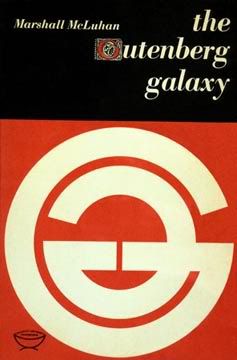Marshall McLuhan: The Gutenberg Galaxy: The Making of Typographic Man (1962–) [EN, BR-PT, CZ]
Filed under book | Tags: · global village, literacy, mass media, movable type, print, renaissance, scholasticism, technology, typography, writing

“In this book, McLuhan analyzes the effects of mass media, especially the printing press, on European culture and human consciousness. It popularized the term global village, which refers to the idea that mass communication allows a village-like mindset to apply to the entire world; and Gutenberg Galaxy, which we may regard today to refer to the accumulated body of recorded works of human art and knowledge, especially books.
McLuhan studies the emergence of what he calls Gutenberg Man, the subject produced by the change of consciousness wrought by the advent of the printed book. Apropos of his axiom, “The medium is the message,” McLuhan argues that technologies are not simply inventions which people employ but are the means by which people are re-invented. The invention of movable type was the decisive moment in the change from a culture in which all the senses partook of a common interplay to a tyranny of the visual. He also argued that the development of the printing press led to the creation of nationalism, dualism, domination of rationalism, automatisation of scientific research, uniformation and standardisation of culture and alienation of individuals.”
Publisher University of Toronto Press, 1962
ISBN 0802060412, 9780802060419
300 pages
The Gutenberg Galaxy (English, updated on 2021-1-6)
A galáxia de Gutenberg (BR-Portuguese, trans. Leônidas Gontigo de Carvalho and Anísio Teixeira, 1972, added on 2017-3-12)
Gutenbergova galaxie (Czech, 2000, added on 2017-3-12)
Neil Rhodes, Jonathan Sawday (eds.): The Renaissance Computer: Knowledge Technology in the First Age of Print (2000)
Filed under book | Tags: · history of technology, hypertext, knowledge, memory, print, renaissance, storage, technology

In the fifteenth century the printing press was the ‘new technology’. The first ever information revolution began with the advent of the printed book, enabling Renaissance scholars to formulate new ways of organising and disseminating knowledge.
As early as 1500 there were already 20 million books in circulation in Europe. How did this rapid explosion of ideas impact upon the evolution of new disciplines?
The Renaissance Computer looks at the fascinating development of new methods of information storage and retrieval which took place at the very beginning of print culture. And it asks some crucial questions about the intellectual conditions of our own digital age. A dazzling array of leading experts in Renaissance culture explore topics of urgent significance today, including:
* the contribution of knowledge technologies to state formulation and national identity
* the effect of multimedia, orality and memory on education
* the importance of the visual display of information and how search engines reflect and direct ways of thinking.
Publisher Routledge, 2000
ISBN 0415220637, 9780415220637
212 pages

